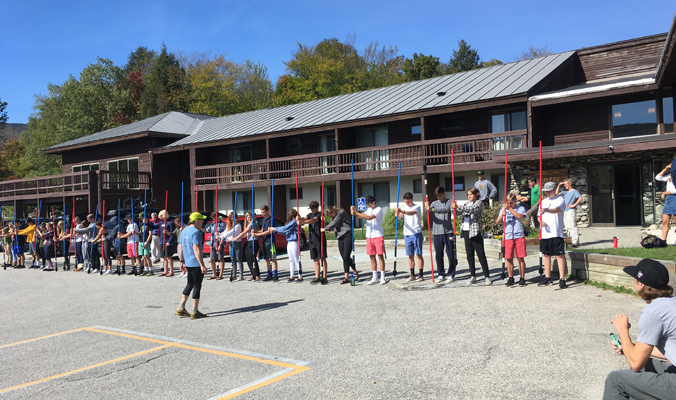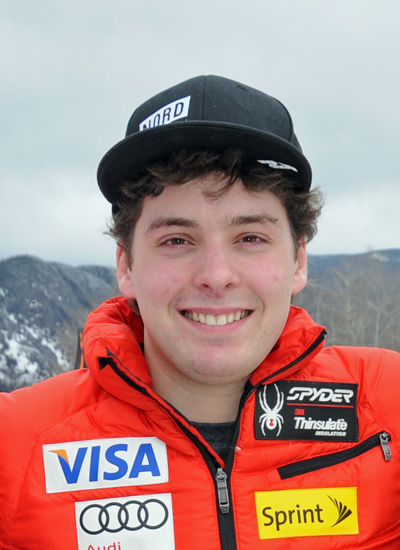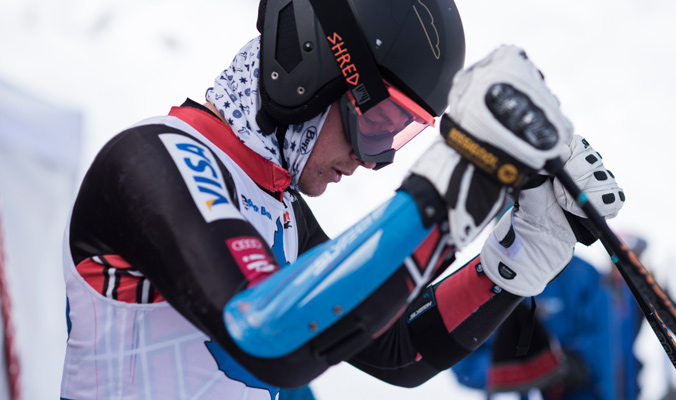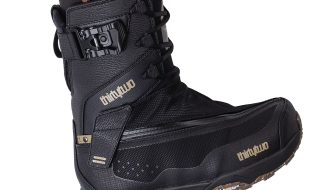
Avalanche instructor Jonathan Sheffitz takes instruction beyond the gates at Vermont’s Killington Mountain School. [Photo] Courtesy BRASS
In January 2015, U.S. Ski Team development athletes Ronnie Berlack, 20, and Bryce Astle, 19, were caught and killed in an avalanche while freeskiing off piste near Sölden, Austria during a trip to compete on the Europa Cup circuit. Now, two years later, the Bryce and Ronnie Athlete Snow Safety (BRASS) Foundation is hard at work to change the way U.S. racers view the backcountry and safety, both on snow and off.
Amid his six-stop educational tour of eastern ski academies in October, I caught up with BRASS Executive Director Michael Silitch, a Park City, Utah-based, internationally-certified guide with 18-years of experience working in the Alps, to learn more about the program.
Backcountry Magazine: Tell me about BRASS’s mission.
Michael Silitch: We have four main academic goals this season, starting with our tour of the country’s ski academies. We just had our first one in Killington, Vt., where we are introducing [Killington Mountain School] athletes to avalanche awareness and education. We want to expand and grow some of the current learning material that is out there right now, focusing on what is off piste. For example, at a mountain like Snowbird, there is a big rope going around the entire resort boundary defining the line between on piste and the backcountry. Generally speaking, in the U.S., on-piste terrain is managed for avalanche conditions. When you travel outside the country, like so many of our young skiers today who attend these ski academies, that line defining on and off piste becomes significantly blurred—and is often not even there.
We are also emphasizing heuristics and group dynamics. There are countless times where groups find themselves looking at a slope that could have high avalanche danger, but no one speaks up because it is awkward. It only takes one person to speak up and change the dynamic of a group. Our curriculum is aimed to broaden perspectives.
We also aspire to have every U.S. Ski and Snowboard World Cup athlete be at least AIARE Level 1 certified. This past season, we had 14 U.S. Ski Team World Cup athletes from the entire spectrum of disciplines—from aerialists to snowboard cross—achieve Level 1. We are expecting to grow that number fivefold this season. We completely fund the three-day course, and we hope to grow this to as many people as we can from the ski-academy level and up.
Our last mission is a movie called Off Piste, co-produced by BRASS and the Utah Avalanche Center. The film will be a memorial to the two boys [Berlack and Astle], and it really stresses the importance of avalanche awareness and education.

Ronnie Berlack [Photo] Courtesy BRASS

Bryce Astle [Photo] Courtesy BRASS
BCM: Tell me about the attitude of skiers before the founding and implementation BRASS programming.
MS: The more experienced World Cup athletes have more awareness for the risks of traveling off piste. Some who have real estate in Europe actually have airbags, beacons, probes and shovels stashed there for when they want to go. Many of the younger skiers and athletes at the academy level on the East Coast don’t think they need avalanche training, because there isn’t much danger. It’s these same kids who will soon be traveling out West and around the world, where this training is absolutely necessary. Interestingly enough, we had our first training in Killington, where an instructor there told stories of avalanches that have occurred on the East Coast, proving to these kids how important awareness really is.
BCM: How is BRASS funded?
MS: I’m glad you asked. Bryce and Ronnie’s parents started this whole thing and made an initial gift, along with help from the U.S. Ski and Snowboard Team. Today, the foundation is a nonprofit organization that relies on the continued gifts from the community surrounding the U.S. Ski and Snowboard Team, as well our generous sponsors: Blizzard, Tecnica, BCA and Recco. We are always looking for contributions to expand our programming and our reach.
BCM: Tell me more about the film, Off Piste.
MS: It is a full-blown reenactment of Bryce and Ronnie’s fatal day, complete with epic ski footage and some other details that I am not yet at liberty to talk about. Ronnie has two brothers who are acting in the film, which will be very special to see. I am locked up as for the rest of the details, but it is being directed and shot by the same guys who did the Know Before You Go video, which was really well done and powerful and something that everybody should watch. Off Piste is set to premiere in late November.
BCM: Why, ultimately, is it so important to train these racers while they’re still young?
MS: It is definitely important to have these lessons, and particularly the attitude, that stresses safety and informed decisions ingrained at an early age. I raised my children in Chamonix, France, and in first grade these big burly guys from Chamonix’s mountain rescue service—kind of like the Navy SEALS of the mountains—came in and spoke about mountain safety and risk awareness. Every year after that until I moved my family to Park City, my children had school programming concerning mountain safety and education. BRASS is trying to bring that culture here and provide that level of early education to as many as effectively possible.










Related posts:
Holly Walker’s apprentice ski guide journey
Steep School: learning the tools for ski mountaineering in Montana’s Tobacco Root Mountains
The Skills Guide: Four steps for Blissful Ascents
The Skills Guide: Four Steps to Overcome Human Traps